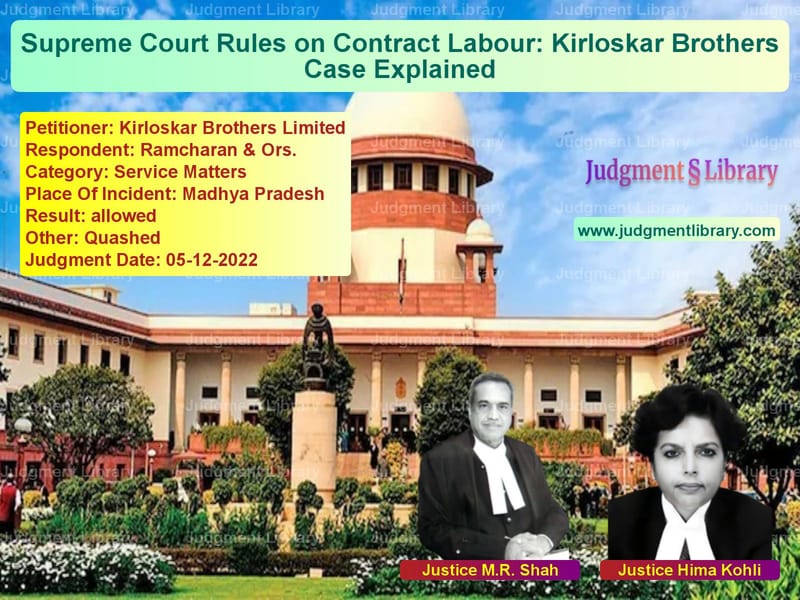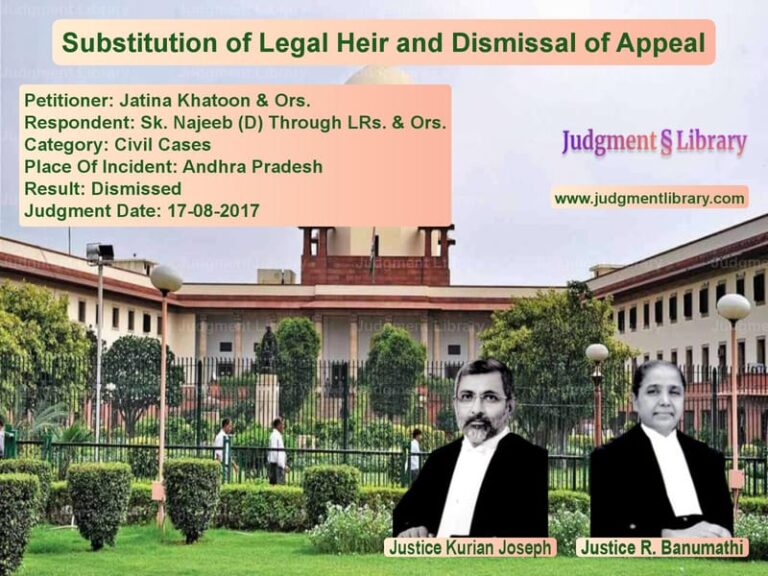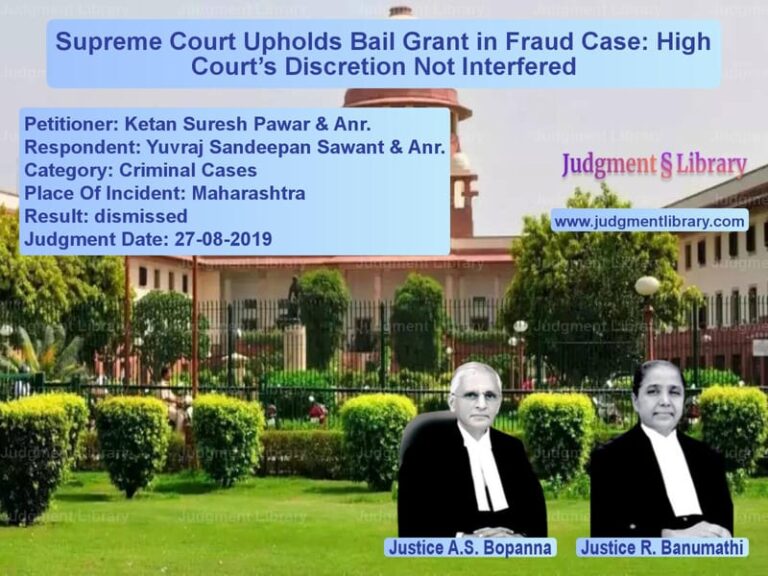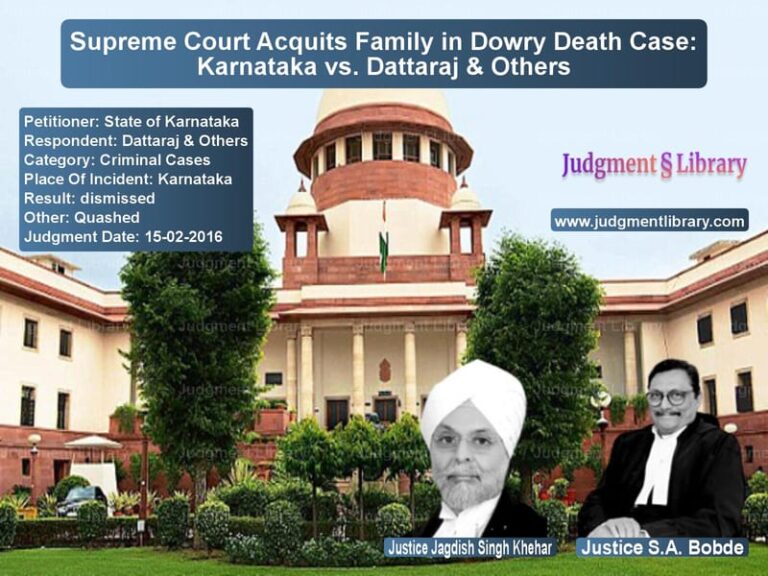Supreme Court Rules on Contract Labour: Kirloskar Brothers Case Explained
The Supreme Court of India recently delivered a significant judgment in the case of Kirloskar Brothers Limited vs. Ramcharan & Ors., addressing the legal status of contract labour and their absorption by the principal employer. The case revolved around whether contract labourers, after the termination of their contract, could claim direct employment with the principal employer under the Contract Labour (Regulation and Abolition) Act, 1970 (CLRA Act).
The Supreme Court ruled in favor of the employer, Kirloskar Brothers Limited, overturning the orders of the Industrial Tribunal and the Madhya Pradesh High Court, which had directed the reinstatement of the contract workers. This ruling clarifies the legal position regarding contract labour absorption and sets a precedent for similar cases.
Background of the Case
The case originated when respondent workers, who were employed through a contractor, sought reinstatement after the contract ended. The key timeline of events is as follows:
- April 22, 1995: Kirloskar Brothers Limited entered into a contract with a labour contractor (respondent no. 7) to hire workers.
- October 7, 1996: The labour contract expired, and the services of the workers were terminated.
- January 25, 1997: Kirloskar Brothers Limited filed a return under the CLRA Act, confirming that the contract had ended.
- 2002: The Labour Court ruled that the workers were employees of the contractor, not Kirloskar Brothers Limited.
- 2004: The Industrial Tribunal reversed the Labour Court’s decision, holding that the workers automatically became employees of the principal employer.
- 2018: The Madhya Pradesh High Court upheld the Industrial Tribunal’s decision.
- December 5, 2022: The Supreme Court ruled in favor of Kirloskar Brothers Limited, setting aside the previous decisions.
Arguments by the Appellant (Kirloskar Brothers Limited)
The employer, Kirloskar Brothers Limited, through its counsel, presented the following key arguments:
- The contract with the contractor was legally valid and followed all necessary compliance under the CLRA Act.
- The workers were never directly employed by Kirloskar Brothers Limited and were engaged solely through the contractor.
- There was no notification under Section 10 of the CLRA Act prohibiting contract labour in their establishment.
- The Industrial Tribunal and the High Court wrongly assumed that contract workers automatically become employees of the principal employer after termination.
- The courts failed to establish that the contract was a sham or a camouflage to evade labour laws.
Arguments by the Respondents (Workers)
The workers argued:
- They had worked under the supervision and control of Kirloskar Brothers Limited.
- The employer deducted their Provident Fund (PF) contributions, indicating an employer-employee relationship.
- The termination of their services was illegal, and they should be reinstated.
- The Industrial Tribunal and the High Court correctly recognized them as employees of Kirloskar Brothers Limited.
Supreme Court’s Judgment
The Supreme Court set aside the Industrial Tribunal and High Court’s decisions, ruling in favor of Kirloskar Brothers Limited. The key findings were:
- The contract between Kirloskar Brothers Limited and the contractor was legally valid and not a sham.
- There was no notification under Section 10 of the CLRA Act prohibiting contract labour, which means automatic absorption was not applicable.
- Mere payment of Provident Fund contributions by the employer does not create an employer-employee relationship.
- The workers failed to provide evidence that the contract was a camouflage to evade labour laws.
- The courts below wrongly applied the provisions of the Madhya Pradesh Industrial Relations Act (MPIR Act) instead of the CLRA Act.
The Court quoted its previous judgment in Steel Authority of India Ltd. vs. National Union Waterfront Workers (2001), which held:
“Neither Section 10 of the CLRA Act nor any other provision in the Act, expressly or by necessary implication, provides for automatic absorption of contract labour on issuing a notification by the appropriate Government.”
Legal Precedents Cited
The Supreme Court relied on several key judgments to justify its ruling:
- Steel Authority of India Ltd. vs. National Union Waterfront Workers (2001): Established that contract labour cannot be automatically absorbed by the principal employer.
- International Airport Authority of India vs. International Air Cargo Workers’ Union (2009): Reaffirmed that contract workers do not become direct employees unless the contract is proven to be a sham.
Impact of the Judgment
This Supreme Court ruling has major implications for labour laws and contract employment in India:
- Clarifies employer responsibilities: Principal employers are not required to absorb contract workers unless a notification under Section 10 of the CLRA Act is issued.
- Reduces uncertainty for businesses: Prevents the risk of unexpected liabilities for companies engaging contract labour.
- Strengthens legal position of contract employment: Affirms that contract workers remain employees of the contractor unless proven otherwise.
- Limits the scope of industrial tribunals: Ensures that tribunals do not misinterpret labour laws and incorrectly order reinstatement.
Conclusion
The Supreme Court’s decision in Kirloskar Brothers Limited vs. Ramcharan & Ors. reinforces the principle that contract labour does not automatically become employees of the principal employer. By upholding the legality of valid contract employment, the ruling provides much-needed clarity on the rights and responsibilities of employers and contract workers.
The judgment ensures that companies can engage contract labour without fear of arbitrary absorption while also protecting workers from exploitation under sham contracts. This landmark ruling will guide future disputes related to contract employment and reinforce the legal framework governing labour laws in India.
Petitioner Name: Kirloskar Brothers Limited.Respondent Name: Ramcharan & Ors..Judgment By: Justice M.R. Shah, Justice Hima Kohli.Place Of Incident: Madhya Pradesh.Judgment Date: 05-12-2022.
Don’t miss out on the full details! Download the complete judgment in PDF format below and gain valuable insights instantly!
Download Judgment: kirloskar-brothers-l-vs-ramcharan-&-ors.-supreme-court-of-india-judgment-dated-05-12-2022.pdf
Directly Download Judgment: Directly download this Judgment
See all petitions in Employment Disputes
See all petitions in Public Sector Employees
See all petitions in Judgment by Mukeshkumar Rasikbhai Shah
See all petitions in Judgment by Hima Kohli
See all petitions in allowed
See all petitions in Quashed
See all petitions in supreme court of India judgments December 2022
See all petitions in 2022 judgments
See all posts in Service Matters Category
See all allowed petitions in Service Matters Category
See all Dismissed petitions in Service Matters Category
See all partially allowed petitions in Service Matters Category







